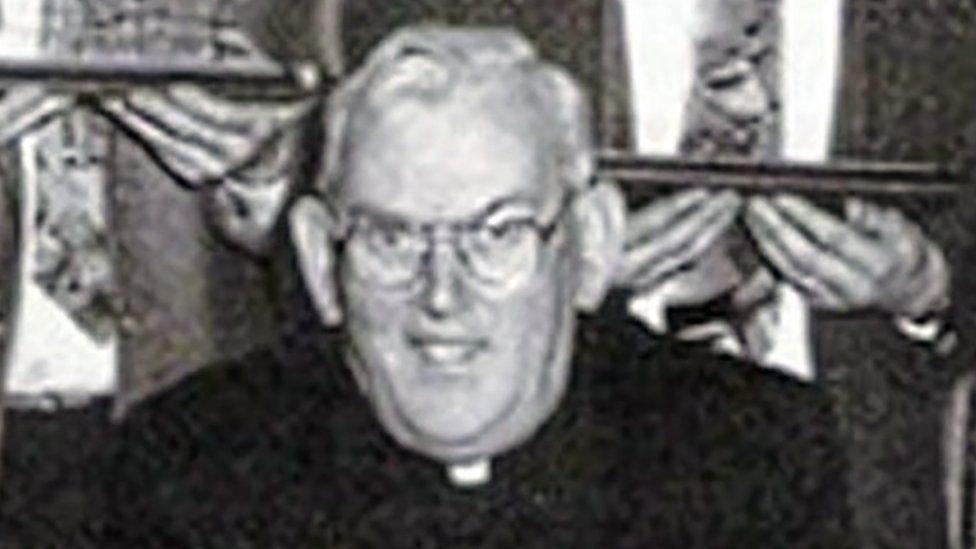Catholic Church: Redress scheme for Dromore sex abuse survivors
- Published
Archbishop Eamon Martin apologises for abuse carried out by priests in the Dromore diocese
A redress scheme has been set up by the Catholic Church in the Dromore diocese for victims and survivors of clerical sex abuse.
The diocese said it is prepared to "exhaust" its resources to fund the scheme.
Father Malachy Finnegan, who died in 2002, was accused of a catalogue of sex abuse within the diocese over a period of four decades.
A statement of apology for all abuse perpetrated was issued on Wednesday.
A cap of £80,000 has been put on individual cases as part of the redress scheme.
Lawyer Kevin Winters, who represents victims and survivors of abuse within the Dromore diocese, welcomed the scheme.
He said new complaints had been filed with police in connection with Fr Finnegan.
However, abuse survivor Paul Gilmore criticised the scheme and said the diocese was trying to minimise its financial liability by introducing a cap on compensation claims.
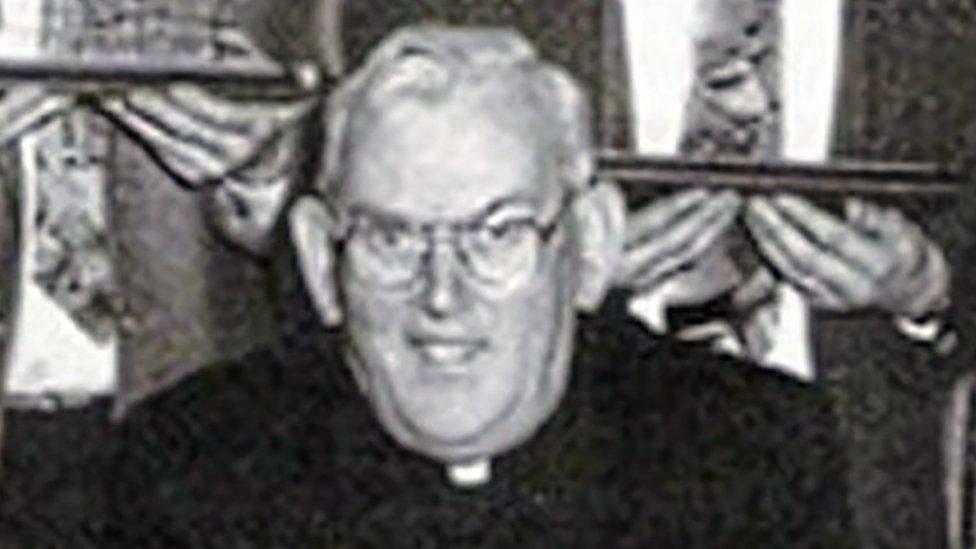
Fr Malachy Finnegan was accused of a campaign of child sexual abuse lasting four decades
Archbishop Eamon Martin, the apostolic administrator in the diocese, issued the statement at a news conference in Newry.
It said: "The Diocese of Dromore is initiating a redress scheme for victims of sexual abuse by priests in the diocese."
'Reasonable compensation'
In its statement of apology, the diocese said it is "committed to doing what it can to help bring healing to the survivors of clerical sexual abuse and to all those affected by these egregious crimes.
"Having met with a number of survivors, and having examined the various existing legal claims against the diocese, Archbishop Eamon Martin wishes to facilitate a resolution process to enable the provision of financial and other supports for survivors without undue further delay."
The diocese said the redress scheme would be open to victims and survivors of abuse suffered "at the hands of representatives of the diocese".
"It endeavours to ensure a process which is victim-centred and aims to provide victims with recognition and reasonable compensation without the need for lengthy investigation and litigation," the statement added.
"The diocese understands that redress may take varying forms. As well as enabling the provision of financial redress, the scheme includes the possibility of a personal apology on behalf of the diocese and other ways of providing pastoral support. The diocese will also support the provision of counselling via the Towards Healing service.
"The diocese is willing to commit whatever resources it has available for the purpose of redress to this scheme, even if that should exhaust those resources."
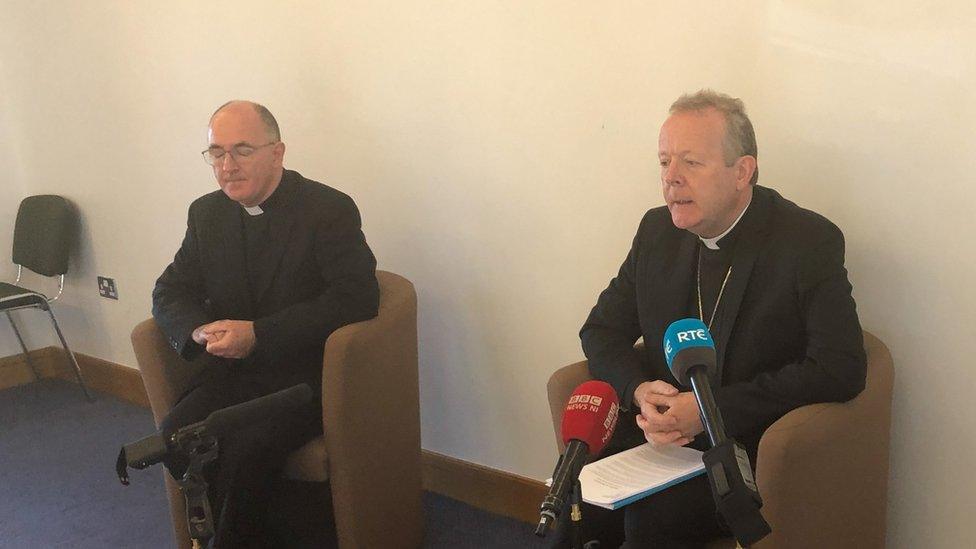
Archbishop Eamon Martin (right) said £2m been paid out in legal settlements
Archbishop Martin said complaints about abuse from approximately 70 people had been made in the past 35 years in the Dromore diocese.
It is believed the majority of them, about 40, concerned Fr Finnegan.
He said the diocese had funds of about £2.5m available for the redress scheme.
He added about £2m had already been paid out in legal settlements and 15 cases had been settled.
Questions have been raised about the future of the diocese, and a possible merger with a neighbouring diocese, but Archbishop Martin said no decisions had been taken.
The lengthy statement included details of how the scheme will operate.
It said: "The scheme will respond to applications where there are allegations of sexual abuse (including sexual grooming), which may or may not have been accompanied by physical and/or emotional abuse, and which occurred when the applicant was under the age of 18.
"All applications will be assessed by an independent Panel, appointed via an independent process managed by a third party organisation. In assessing applications the Panel will have regard to all the available information and make its decision on the balance of probabilities and on a majority basis.
"The process will fall outside the civil litigation process and be comparable to a mediation. It is anticipated that the process will be informal in nature but is intended to be binding on the parties should a resolution be agreed."
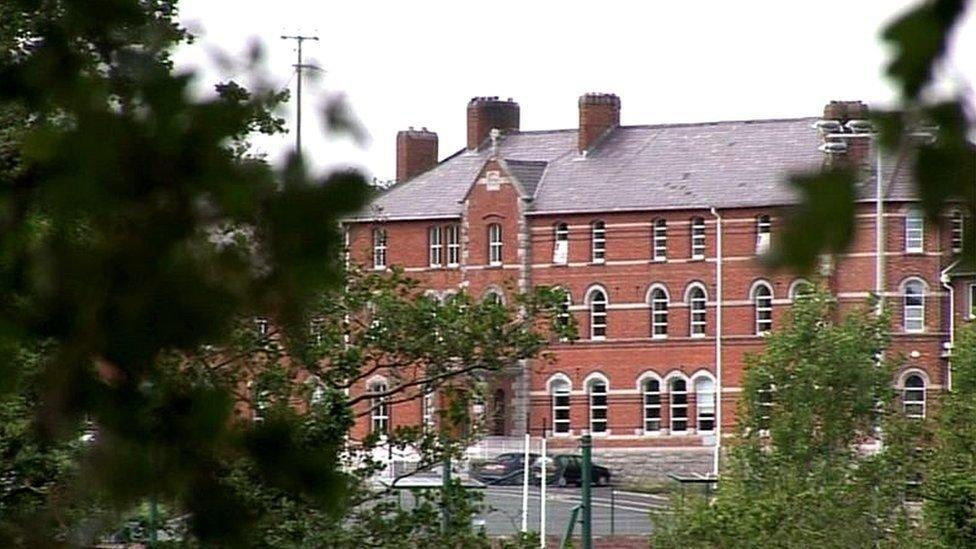
Fr Finnegan taught at St Colman's College in Newry and was later its president
The statement added that Archbishop Martin was committed to continuing his pastoral outreach to survivors, and making himself available to meet victims.
'Long overdue'
Mr Winters, representing victims and survivors, said the process to "address decades long unresolved sexual, mental and physical abuse perpetrated by priests and others" was "long overdue".
"Over half a million pounds has already been paid out by the Diocese to survivors we represent," he said, adding that the figure "continues to rise".
However, Mr Winters said many survivors of abuse "will find it hard to sign up to a process which simply cannot deliver on explanations why perpetrators were able to systemically abuse children with impunity".
Mr Winters said new complaints have been filed with the Police Service of Northern Ireland (PSNI) over Finnegan.
"To give context to today's announcement, redress can form part of a process of closure for survivors but it won't resolve the criminal culture of silence of many people who were in a position to do the right thing but didn't," he said.
'Nonsense'
Abuse survivor Paul Gilmore, who now works as a lawyer in the US, was highly critical of the compensation scheme.
Speaking on the BBC's Evening Extra programme, he accused Archbishop Martin of a cynical attempt to minimise the Catholic Church's financial and reputational damage.
"He's trying to control the amount of money that the diocese is going to be on the hook for, both in terms of the total liability for all the victims and the individual liability for each person," Mr Gilmore said.
"I don't think any of us are in this for the money, but to impose an arbitrary limit of £2.5m on the total compensation bill is ludicrous.
"The Diocese of Dromore is part of the wider Catholic Church so, at the end of the day, should this cost them £20m, there are funds available to pay this."
Mr Gilmore said he was "not convinced" that the church was offering victims a route to compensation without the trauma of having to go through civil legal proceedings.
He argued it is likely that survivors will be asked about their abuse in order to qualify for the church's compensation scheme.
Mr Gilmore also expressed concern about the operation of the independent panel which will be set up to assess victims' applications, describing it as the "equivalent to a secret court".
He said he feared there would be no scrutiny of the panel's decisions nor independent oversight of the process.
- Published21 June 2021
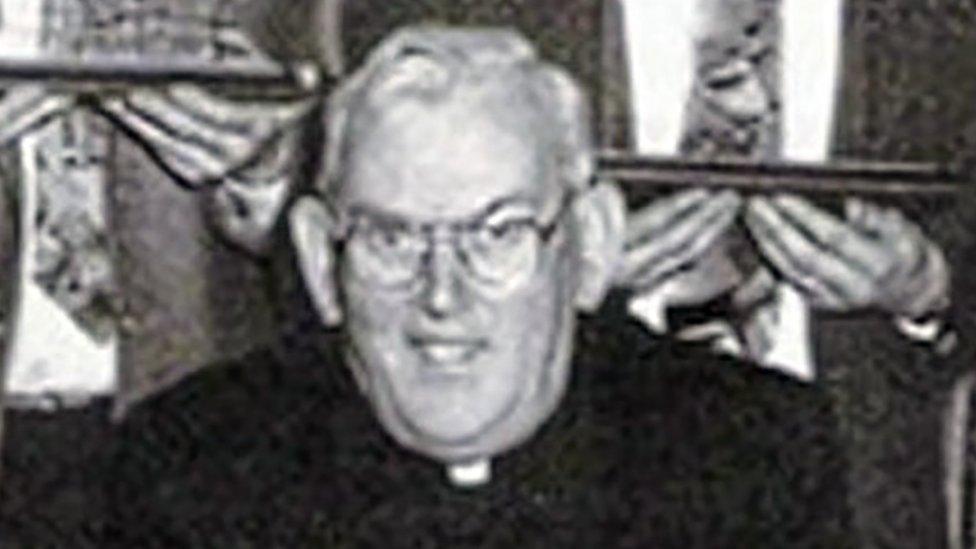
- Published24 June 2021
